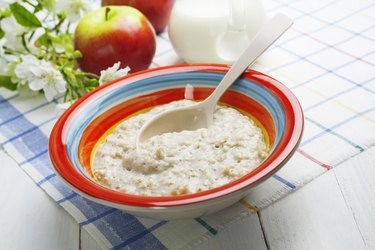
Meal-replacement diets claim to help you shed excess pounds by reducing your daily caloric intake. While some meal-replacement diets can help you lose weight, not all are created equally. If you are trying to get rid of excess pounds, reducing how many calories you consume and increasing how many calories you burn is an effective way to reach your goals. Replacing one or two meals a day with oats and protein is one way to reduce your total calorie consumption, but you should have all the information before using it as your weight-loss plan.
Meal Replacement
Video of the Day
With a meal-replacement diet, you replace one or two of your regular meals with products that are lower in calories. In most cases, you would replace breakfast, lunch or both, and then eat a healthy and well-balanced evening meal. Most meal-replacement products come in the form of shakes, bars, drinks and cookies. The average meal-replacement diet plan restricts your intake of calories to between 800 and 1,000 per day. You can design your own meal-replacement plan using low-calorie and nutritious foods in place of your regular meals, but always speak with your doctor before starting this type of diet plan to be sure it is safe for you.
Video of the Day
Oats
Oats are high in fiber and low in fat and calories. According to the Harvard School of Public Health, fiber is the part of a carbohydrate that cannot be digested. Fiber can improve your health by reducing your risk for type 2 diabetes, heart disease and constipation. According to a 2009 study published in the "American Journal of Clinical Nutrition," an increased intake of cereal fiber could aid in weight loss. Replacing one or two meals with a bowl of high-fiber oatmeal can help increase your intake of fiber while also potentially reducing your caloric intake.
Protein
Protein is present in animal foods -- like meat, milk and cheese -- as well as certain legumes, such as beans and nuts. Protein could be beneficial in helping you lose weight because it moves through your digestive system more slowly, which can help you feel full for longer periods of time. A 2009 study published in the "New England Journal of Medicine" found that increasing protein intake does help with initial weight loss, though regaining weight is common after a year. Replacing one or two meals with certain protein foods might help you reduce your caloric and fat intake. Beans and lentils are lower in fat and calories than beef or pork. Add protein to your oats to maximize your potential weight loss and to replace your regular meals. Stir peanut or almond butter into your oatmeal or sprinkle it with chopped nuts to increase the protein content.
Considerations
Ask your doctor if a protein-and-oat meal-replacement plan is safe for you before beginning to replace any meals. Many meal-replacement diets limit your intake of certain foods by restricting you to a specific number of calories. This can result in nutrient deficiencies. A 2010 study published in the "Nutrition Journal" notes that some meal-replacement plans are nutrient-dense and effective ways to lose weight. However, when you create your own meal-replacement plan, you might miss out on key nutrients. If you eat only oats and protein for one or two meals, you are likely not consuming adequate amounts of fruits, vegetables and low-fat dairy foods, leaving you deficient in vitamin C, potassium and calcium.
- EveryDiet: Meal Replacement Diets
- Harvard School of Public Health: Fiber, Start Roughing It!
- Nutrition Journal: Efficacy of a Meal Replacement Diet Plan Compared to a Food-Based Diet Plan After a Period of Weight Loss and Weight Maintenance
- American Journal of Clinical Nutrition: Dietary Fiber and Subsequent Changes in Body Weight and Waist Circumference in European Men and Women
- New England Journal of Medicine: Comparison of Weight-Loss Diets with Different Compositions of Fat, Protein and Carbohydrates